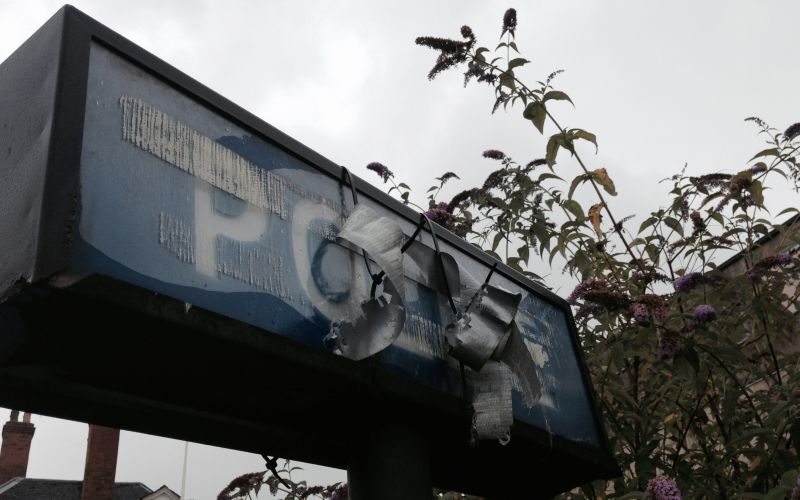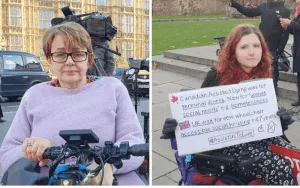The number of disability hate crimes recorded by police has fallen by nearly 20 per cent in a year, Home Office figures have revealed, but the number of prosecutions has also continued to drop.
The figures show the number of disability hate crimes recorded by police in England and Wales dropped by 18 per cent over the last year to 11,719 offences, from 14,285 in 2022-23.
Most of the offences were for allegations of stalking and harassment (41 per cent), public order (30 per cent), and violence (17 per cent).
But the proportion of offences tagged as disability hate crimes that resulted in the alleged perpetrator being charged or summonsed to appear before a court has again remained worryingly low.
Just one per cent of offences of violence against the person, two per cent of public order offences, and two per cent of criminal damage and arson offences resulted in a charge or summons, according to the Home Office.
The Crown Prosecution Service (CPS) stressed that it can only consider charging a suspect if cases are referred to it by police.
It is now the sixth year that Disability News Service (DNS) has been raising concerns about the low number of cases being passed to the CPS by police, and how few disability hate crime prosecutions are taking place, despite huge numbers of recorded offences.
In 2023-24, just 338 disability hate crime cases were referred to CPS by police – despite 11,719 recorded offences – although this was an increase on the 269 referred in 2022-23.
CPS figures* also show that in the year to April 2024, prosecutors completed just 306 prosecutions for offences tagged as disability hate crimes, a fall from 311 last year.
As recently as 2016-17, CPS was completing 1,009 prosecutions of disability hate crimes.
Successful prosecutions also continued to fall, with convictions dropping from 245 in 2022-23 to 233 last year.
The Home Office and CPS reports mean that in 2016-17, there were about 5,400 disability hate crime offences recorded by police and 1,009 prosecutions (prosecutions making up 18.7 per cent of offences), compared with 11,719 offences and 306 prosecutions in 2023-24 (just 2.6 per cent of offences).
Both CPS and the National Police Chiefs’ Council have been promising to improve their performance on providing justice for victims of disability hate crime since 2022.
Dr David Wilkin, a disabled activist, researcher, author** and support worker for victims of disability hate crime, said: “Unfortunately, whilst there has been a slight downturn in hate crime occurrences in England and Wales, this seems to fly in the face of the behaviours that we have witnessed over the summer of 2024 which have caused distress to many of us who are considered to be in a minority or vulnerable.
“The continuing concern is the small number of cases being referred to the CPS for summons or charge.
“There may be many reasons for this, including a lack of evidence, no witnesses to the incident or the CPS judging the case not to be in the public interest to pursue.
“It also might be indicative of the amount of time and preparation undertaken by the police to present that case to the CPS.
“Whichever the reason, the victim, having used courage and taken the time to report the hate crime, is seemingly not being allowed to travel further along the road to justice.
“We need to find out why.”
As part of Hate Crime Awareness Week, Inclusion London released an open letter to the prime minister this week, calling on him to “foster ‘respect and equality for all’ by ensuring justice for Disabled victims of hate crime”.
The letter calls for disabled people to be included in the “development and implementation of more neighbourhood policing, tougher sentencing, and reform of the UK’s hate crime legislation during this parliamentary term”.
Organisations can add their names to the letter.
Louise Holden, senior policy officer on disability and crime for Inclusion London, said: “It has been a cause of major concern to our work that the low conviction rates have not improved despite our continuing efforts.”
She said there was “a sense of the whole system at the brink of collapse”.
She added: “We know that the official figures for hate crime against disabled people do not reflect our daily experience.
“Despite agencies working to improve reports and prosecutions, we are seeing a fall in reported figures for the first time.
“I am certain that disability hate crime has not fallen. The system is failing us, what has been tried is not working.
“We are in an increasing hostile and volatile society, where hate crimes are rising overall.
“The perpetrators of hateful acts operate in a society that allows disabled people to be demonised and inhumanly treated.
“We need more than a tweak to the law. We need a national plan, and resources to address the systemic issues that allow hate crimes against disabled individuals to persist.”
CPS refused – as it did last year – to suggest an explanation for the failure to increase the number of prosecutions for disability hate crime.
But a CPS spokesperson said in a statement: “Hate crimes against disabled people are despicable.
“We bring charges in nearly eight out of every 10 cases referred to us by the police and more than three quarters of these prosecutions result in a conviction.
“We do not hesitate to prosecute where there is enough evidence to do so, and we encourage anyone who has been a victim of a hate crime to report incidents to the police.”
But CPS said it would soon publish a guide on disability hate crime, for prosecutors and police officers, which will include advice on recognising, responding to, investigating and prosecuting disability hate crimes.
The National Police Chiefs’ Council refused to comment, as it did last year.
*See Prosecution Crime Type Data Tables, tables 8.4 and 9.1
**Disability Hate Crime: Perspectives for Change, was published by Routledge last month
A note from the editor:
Please consider making a voluntary financial contribution to support the work of DNS and allow it to continue producing independent, carefully-researched news stories that focus on the lives and rights of disabled people and their user-led organisations.
Please do not contribute if you cannot afford to do so, and please note that DNS is not a charity. It is run and owned by disabled journalist John Pring and has been from its launch in April 2009.
Thank you for anything you can do to support the work of DNS…

 Labour’s watered-down policy on high-rise evacuation ‘is insult to disabled people who died in Grenfell fire’
Labour’s watered-down policy on high-rise evacuation ‘is insult to disabled people who died in Grenfell fire’ Disabled activists pledge to continue to fight assisted suicide bill, after MPs vote in favour
Disabled activists pledge to continue to fight assisted suicide bill, after MPs vote in favour Assisted suicide vote will make other campaigning tougher, say activists
Assisted suicide vote will make other campaigning tougher, say activists